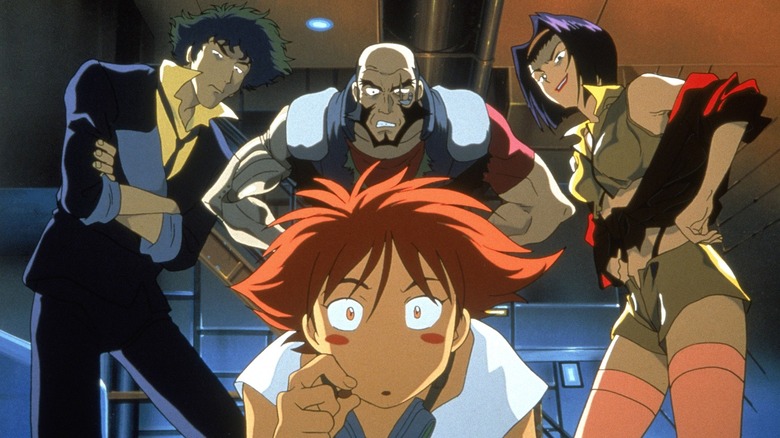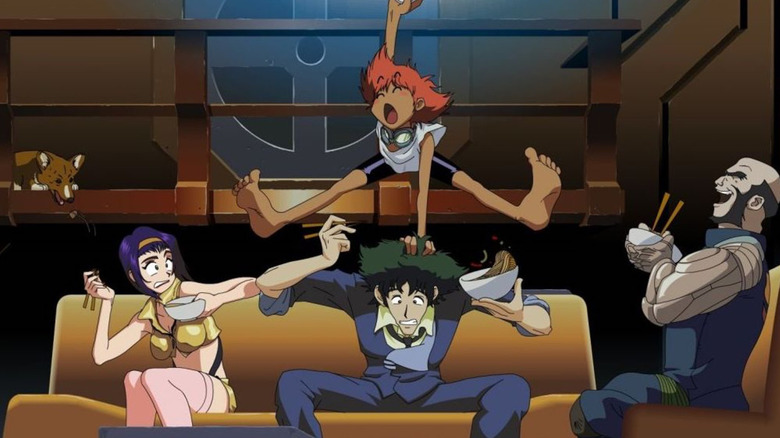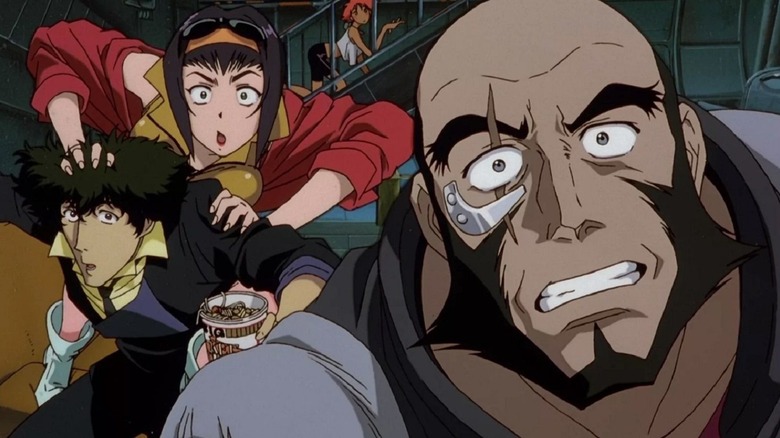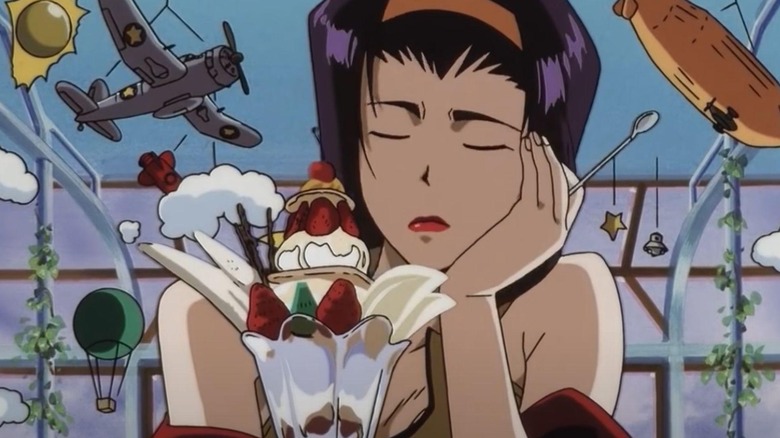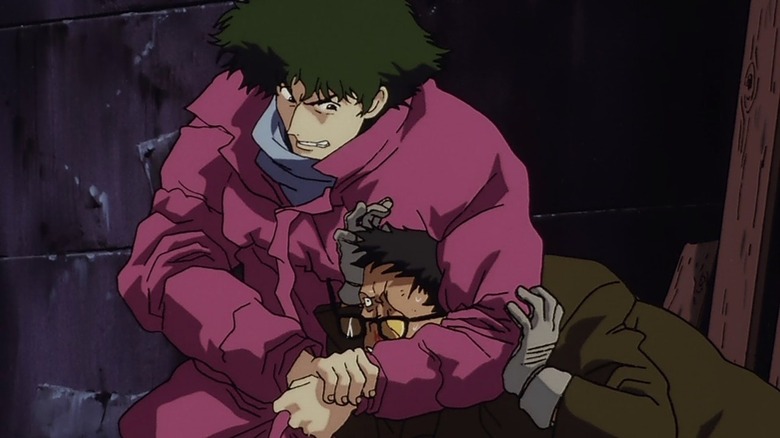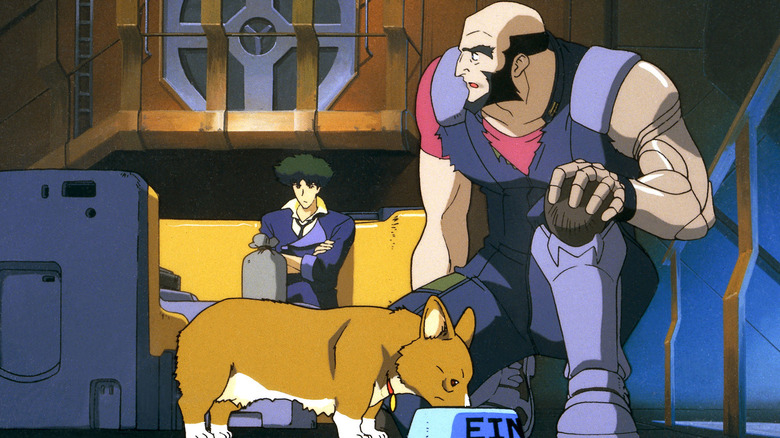The Cowboy Bebop English Voice Cast Chat About The Show's Legacy [Interview]
The classic anime "Cowboy Bebop" is having another big moment in the pop culture zeitgeist. Not only is there a big-budget live-action adaptation coming from Netflix on November 19, 2021, but fans are discovering and re-discovering the anime series on streaming services. (You can watch all 26 episodes on Funimation, Hulu, and Netflix right now.) The series debuted in the U.S. in 2000, and the localization and dubbing are considered some of the best in anime history. Created by Shinichiro Watanabe, the series follows space cowboys/bounty hunters Spike Spiegel (Steve Blum), Jet Black (Beau Billingslea), Faye Valentine (Wendee Lee) and Radical Edward (Melissa Fahn) as they try to exist in a rough-and-tumble galaxy where only the tenacious survive.
I had a chance to chat via Zoom with voice actors Blum, Billingslea, Lee, and Fahn about the lasting legacy of "Cowboy Bebop" and their incredible cast chemistry. And yes, hearing all their voices in conversation with me is as wild as you'd expect.
This interview has been lightly edited for clarity.
A Perfect Storm of Influences and Timing
"Cowboy Bebop" really helped bring anime to America. It was the first series ever shown on Cartoon Network's Toonami, and it's still frequently very referenced and beloved. What do you think made "Bebop" stand the test of time?
Wendee Lee: We feel like we're repeating ourselves because this is the golden question we get with everyone, but it's so relevant. Do you guys want to hit on the bullet points? Because I think we've really condensed it down into some important points.
Beau Billingslea: Go for it Faye Faye!
Melissa Fahn: Go for it! It's interesting before you start, we've really been understanding this and discovering this through today, through this press junket. Even more so than ever. So go ahead and start. It's really powerful.
Lee: We're sort of drilling down in hindsight into what these factors are that all came together to create this perfect storm, like Steve says. And it's really a lot of elements, but I think what was going on is that the creators were making the story they wanted to create, honoring their influences that happen to be the rock and roll roots of the US, jazz, Motown, you name it. All the musical influences are woven into the fabric and tone of this series. And it sets a stage that allows characters to unveil, become, peel back the layers and you find out who they are and you stick with it, because there's so many little details that all come together to really reveal much deeper characters than you would think on the surface. And it broke the molds of many of these characters. They weren't stereotypical. They were very fluid.
We've been talking about Ed being like water and being sort of in between male and female and sort of not white and not black. And sort of not grounded, not entirely fairy-like. Relates to animals. But I mean, I don't even know if I'd heard of hacking at that point. That's something else I just thought of. Very ahead of its time in integration. So there's a lot of integration going on that seems to be very top down, being forced into entertainment today. But I think it's really the basis of how Bebop was woven and how it was spun into reality.
"It just became our job not to screw it up."
Steve Blum: I did a panel with some of the Japanese creators a couple of years ago, and I was shocked to hear that these guys kind of made this from the perspective of fans, for fans. They were big old nerds and they just put a lot of the elements of stuff that they loved. The stuff that was kind of hidden the way in the closets that they couldn't talk about with everybody. And their own machine in Japan didn't really understand what they had and how to market it. And from what I remember, I think they said that only six episodes initially aired in Japan before it was basically canceled. And then they thought, well, here's a junk show. Let's just license it to, whatever it was, Bandai, I guess at the time. And let's see what you guys can do with it. And fortunately they had the foresight to give us the time to really flesh it out and to really appreciate it for what these guys had created. This masterpiece that they had created.
And it just became our job not to screw it up. And fortunately we were able to put it on the air. Not we, I had nothing to do with it. But Cartoon Network at the time and Toonami had the foresight to put this thing out there on the air and give another venue for people to view this type of art making that they weren't used to. They had to pay 85 bucks for a single episode of stuff back then, if they were lucky enough to find it. So to put this out there to a wide audience and something of such quality. That we actually had the time to spend and actually honor the quality of the product that we were given. Once that got out there, a lot of it had to do with timing, but it had to do with all of these amazing elements from the music forward that really needed to be seen. And I'm just so grateful that it happened when it happened and how it happened. It was truly the perfect storm.
Creating Camaraderie In a Sound Booth
The chemistry between the crew of the Bebop is part of what makes the series sing. And I know a lot of the time you fit when you do voice acting, you recording your own booths. How did you manage to bring that much camaraderie when you were recording by yourselves?
Fahn: I think that was our director. She was our common thread. Mary... We would go in individually. We weren't even in the same building at the same time. If we're lucky, we would say, "Hi, are you going in, I'm leaving now." Or maybe we heard the playback if someone recorded before us. But I think the common thread was our director, Mary. She brought the chemistry to each of us for each of those characters and she channeled it into all of us. And I think it was great writing also. And we were so lucky to have this gem of a piece, that as soon as we were all introduced to it, we were all kind of enthralled with and impressed with and like, "Oh my God, what is this piece that I'm a part of"? Like, "What is this"? So I think there was a common like, "Wow, like I don't want to mess this up."
Like Steve said, it was ours to mess up and thank God we didn't. But I think that was the common thread. That's how I look at it. The chemistry. And we all kind of tapped into these characters and we really got into the dialogue and that's our job, but there was something very special and unique for each one of us. That made each character just flushed out even more. Because we all were able to connect on a deeper level. That doesn't always happen. And this is a very special, unique piece.
The Musicality of the Show
Lee: You often hear us talking about the musicality of the show. And that is so integrated into the pacing. So I think a lot of what really developed the characters between the cast, the chemistry in general, is that we were provided a lot of breath in the show. There was a lot of downtime to sort of take in and process what had just been said before a character reacts. It's not the... At the time I had been doing a lot of broadcast TV working for Fox and Saban productions and others. And we were really building a wall of sound at all times. It was, "Look over here. "Okay kids, don't change the channel. "Here's another. And here's a reaction and an explosion." And our job, especially with localizing, was to fill in the gaps and make it a constant wall of sound.
It was a technique that was just exacerbated. And it still carries on in many genres. But as we know, musically, music is nothing without the breaks and breath in the music. And that's what Bebop has. And it's the tonal time that you get. The quality for it to sink in. And that kind of always left me as an actor wondering, "Well, what is the next response going to be? "Let me look ahead." Because there's this long break between maybe a little Barb has been thrown out or a comment about a job, or what have you, and you're going to need to link it up the next time the next person speaks. And it's a deeper dive as an actor than the average time that we get on a fast pace show.
Billingslea: I felt that my career started on camera and there's a difference between television acting and feature film acting. Basically feature film acting, you have time. And as Wendy was saying, that TV is kind of almost like radio. Somebody's got to be talking all the time. Somebody's going to be talking all the time, but it was beautiful that with Bebop, we didn't have that. There'd be times where Jet is just sitting there, when Faye and Spike have gone. And he's trying to pretend he doesn't care. And he's talking to Ein, and we got silence and the audience can absorb what's going on. And to me, that's beautiful storytelling where you give the audience a chance to breathe and absorb what's going on.
A Real Family Affair
Blum: We're talking about the relationship between the characters too. As the show progressed, I began to fall all in love with each of the characters. And I realized that the people who were portraying them, I was falling in love with too. Some of you... Beau and Melissa, I'm not even sure if I knew you before we started working on that show.
Fahn: Steve, we met.
Blum: Oh, we met because of Tommy!
Fahn: In the cave, like way back with "Guyver" and "Orguss" and all that. But that was maybe the last time I had seen you. I mean, that was ancient.
Blum: But you were off being a Broadway star and stuff too. So you were so far beyond our little community and Wendy, I think you were directing me on a couple of things before we did "Bebop." And I was super intimidated to actually work alongside you as an actor. I remember that, but it felt like such a safe space. And as we got to know the characters in the show, I felt like I got to know you guys as people. And I think Danielle, you've probably heard this before, but we really are family. We really look forward to getting together and doing these things. I love these people. They are my family. So that's not always the case. And especially in anime, we don't have that luxury to develop those relationships.
Billingslea: And we have an open ended text conversation that never ends. And remember, eat your bell peppers and beef!
